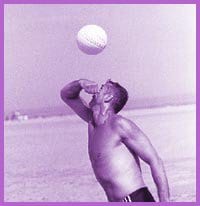In The Gay metropolis, a seminal history of gay life in the US since 1945, author Charles Kaiser devotes more than 65 pages to AIDS, some 25 pages to the gay bar scene and drops reference to author Gore Vidal on some 30 pages.
He makes exactly two miniscule references to gay athletes. Which begs the question: Exactly what role has athletics played in the development of our present-day gay and lesbian community?
Judging from mainstream and even queer media coverage, one would assume virtually nothing. But after talking to volleyball star and gay sports activist JP Bernier, one could assume virtually everything – that is, everything beyond the proverbial sex, drugs and rock and roll.
Which means a close network of friends, according to Bernier, and the development of a community of contacts and support that substitutes as family – is family – for so many gay and lesbian people.
“I think all of my friends are from volleyball or tennis,” says Bernier. “In bars, people aren’t exactly putting their real self forward. In sports, you get to see the person, how they are on a team, under pressure, with other people. It’s a wonderful way to make friends and relationships where guys stay together.”
Bernier, now 45, says he really joined Toronto’s gay community when he was invited to play for a gay men’s volleyball team in 1983. That team would win a gold medal in the second Gay Games in San Francisco in 1986. For the then-29-year-old Bernier, those games proved life altering, and he became a sports activist.
“It was the first time in my life when I really felt empowered as a gay man,” says Bernier, who grew up in the small town of Fort Colonge on the Quebec side of the Ottawa Valley. “To just have the sheer masses of people come out to watch you play. And God love America, it was the height of the AIDS crisis and Americans were much more politically organized and in your face. I got an AIDS test at the Games. I couldn’t even get one in Canada at the time. As Canadians, we try to be nice. A lot of Canadians who became active in the AIDS fight probably took notes from their American counterparts then.”
When Bernier returned home from those Games, he took a hard look at his own life. “A lot of my friends weren’t here anymore, but I was. I asked myself, what am I going to do to make things better? What am I going to give to the community?”
Bernier became an organizing tour de force. He was instrumental in starting the Racquettes, now the Toronto Lesbian And Gay Tennis Association, and the downhill ski club for the Out And Out club, Toronto’s 1,000-member gay outward bound club. He was also a key player on four subsequent Gay Games volleyball teams.
In Amsterdam in 1998, the 6’3″ Bernier, who plays middle, captained his team to a silver medal. He heads to the Sydney Gay Games this year with his Viciously Intermediate Volleyball Association club team, the Lava Boys, named after sponsor Lava Life, which runs the phone chat service Manline.
Bernier also made career changes, switching from being an accountant in the private sector to an out teacher and administrator in the Toronto public school system. A former principal recommended him for his current position as office manager at Danforth Collegiate, calling him an excellent role model for gay youth.
Over the past 15 years, Bernier’s work, along with countless others, has spawned numerous sports leagues in Toronto, which are now flexing their muscles beyond the playing field, raising money and awareness for themselves and various community causes. Toronto’s Gay And Lesbian Sports Alliance, an umbrella organization for some 20 gay and lesbian athletic leagues, estimates that some 3,000 people participate in gay and lesbian affiliated sporting activities in Toronto.
These organizations, says Bernier, have been key in shaping and developing the emotional lives of a new generation of queers. “It [sports] really grounded me in the dark years in the early 1980s, when people were dropping around me like flies. I probably exercised then to escape reality, but it was better than developing a dependency on drugs or alcohol.”
This is part of a series on Toronto Gay Games athletes. The games start Sat, Nov 2.

 Why you can trust Xtra
Why you can trust Xtra


